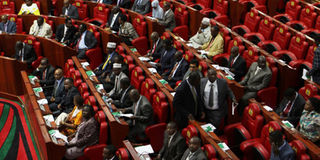Our problem is that we have MPs who have childish self-interests

The National Assembly in session. FILE PHOTO |
What you need to know:
- Parliament can be as venal and as dangerously high-handed as the executive can.
Why do I feel so close to Monica Juma? Because she is my compatriot and sister. Being a human being, she has committed many sins that I have committed.
Among the most mortal ones is that she has once dared to censure an institution which is above criticism.
I can report that this, exactly, is the sin which even I have committed against Parliament. Ever since the Nyayo professor panel-beat Parliament into a contraption for rubber-stamping all presidential policies and activities, no matter how heinously anti-social these were, I have criticised it a plethora of times.
That is why I have never lived in any illusion whatsoever that the House will endorse me should the President nominate me for a public office requiring legislative approval. In a country whose intelligentsia is so rotten and shameless, that is one vital lesson that you must learn quite early in your career as a critic.
It is that, as an individual, you do not chastise the self-styled “august House” if you ever hope that the same House will one day be called upon to endorse your presidential appointment to a public service position constitutionally requiring legislative approval. That is what makes Kenya’s law-making elite such a tragic lot.
They are victims of the infantile disorder which psychology calls narcissism — the self-admiration, self-love and self-importance which once overwhelmed Narcissus, the legendary Pelasgic Greek character who once knelt to look down a well only to immediately fall deeply in love with what he saw down there — namely, the reflection of his own face.
INFANTILE DISORDER
To be sure, there are those Kenyans — especially in the political arena that subsumes Parliament — who criticise merely with the purpose of destroying the spirits of those whom they criticise. But an infantile disorder pervades our ruling class, which daily expresses itself only in our intense aversion to any mere caution.
Ours are Lilliputian minds which react to criticism only with a keen desire to wreak revenge upon even those whose purpose is merely to inspire you into better service. I have not seen the full text in which Ms Juma uttered the alleged word which has stung the “honourable” ones into such self-righteous wrath.
But the point is that she may not be the only sufferer from such parliamentary pollution. No, I am not familiar with Ms Juma’s personal abilities. So I cannot stick my neck out for her. But what if the qualities for which President Kenyatta latched onto her are rare in Kenya? What if she is the near-unique possessor of certain skills?
How can we go on tolerating the terribly debilitating situation in which the childlike — even childish — self-interests of members of the legislature are what dictate to us the kind of personnel we are to invest in various key development and service situations? This, I think, is among the burning questions posed by our new Constitution.
Those who drafted it assumed, apparently, that some appointments are so vital that they cannot be left to the executive branch alone and that, therefore, the legislative branch must be involved. B-right-o! What seems misplaced is the assumption that — because they are elected — something is sacrosanct in the legislators, which the executive does not have.
But our experience shows that — because both come from the same rotten economic class — Parliament can be as venal and as dangerously high-handed as the executive can. As long as our Parliament remains composed of run-of-the-mill intellects, they will respond to personal and tribal interests much sooner than to national interests.
But, clearly, the legislature just cannot serve as our final ethico-intellectual arbiter as to whom the President can or cannot appoint to discharge vital national tasks. The answer must lie in an urgent revisit to the Constitution to find a place much safer than parliament for approving or rejecting all presidential appointments.





